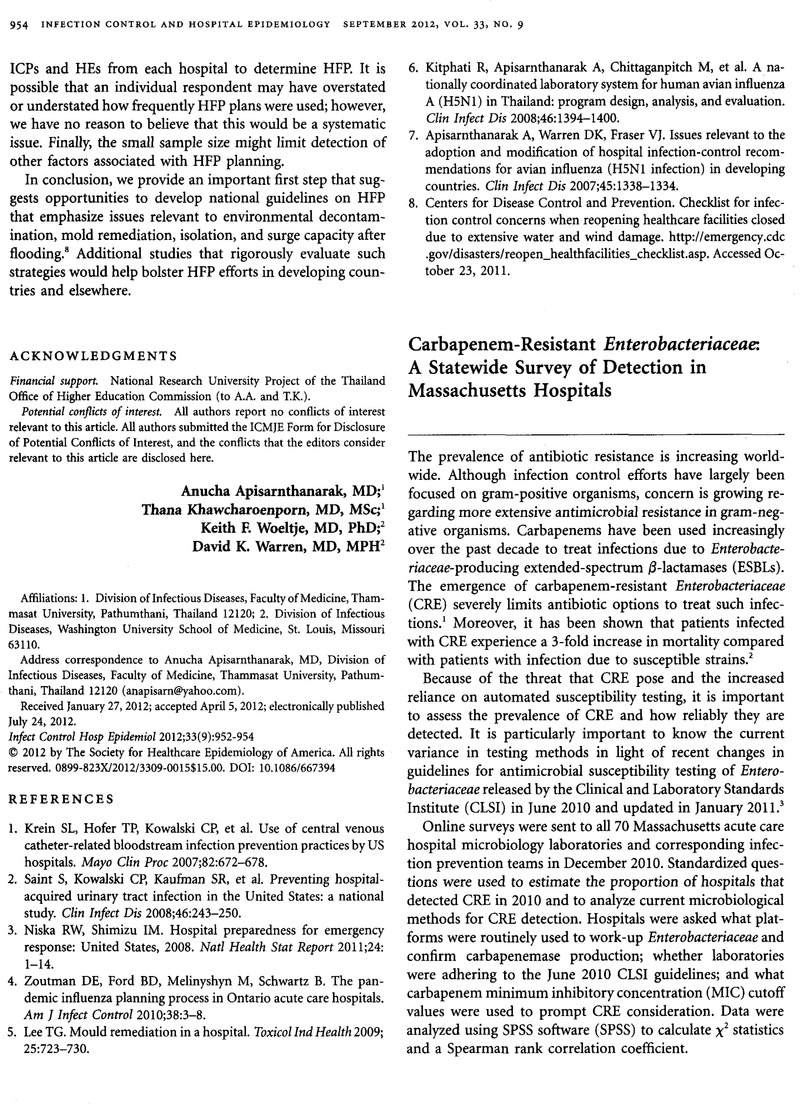Crossref Citations
This article has been cited by the following publications. This list is generated based on data provided by Crossref.
Guh, Alice Y.
McDonald, L. Clifford
and
Sinkowitz-Cochran, Ronda
2013.
Assessment of Public Health Perspectives on Responding to an Emerging Pathogen.
Journal of Public Health Management and Practice,
Vol. 19,
Issue. 4,
p.
E27.
Johnson, J. Kristie
Wilson, Lucy E.
Zhao, LiCheng
Richards, Katherine
Thom, Kerri A.
and
Harris, Anthony D.
2014.
Point Prevalence of Klebsiella pneumoniae Carbapenemase–Producing Enterobacteriaceae in Maryland.
Infection Control & Hospital Epidemiology,
Vol. 35,
Issue. 4,
p.
443.
Thibodeau, Evangeline
Doron, Shira
Iacoviello, Vito
Schimmel, Jennifer
and
Snydman, David R.
2014.
Carbapenem-resistant enterobacteriaceae: analyzing knowledge and practice in healthcare providers.
PeerJ,
Vol. 2,
Issue. ,
p.
e405.
Guh, Alice Y
Limbago, Brandi M
and
Kallen, Alexander J
2014.
Epidemiology and prevention of carbapenem-resistant Enterobacteriaceae in the United States.
Expert Review of Anti-infective Therapy,
Vol. 12,
Issue. 5,
p.
565.
Zerr, Danielle M
Weissman, Scott J
Zhou, Chuan
Kronman, Matthew P
Adler, Amanda L
Berry, Jessica E
Rayar, Jaipreet
Myers, Jeff
Haaland, Wren L
Burnham, Carey-Ann D
Elward, Alexis
Newland, Jason
Selvarangan, Rangaraj
Sullivan, Kaede V
Zaoutis, Theoklis
and
Qin, Xuan
2017.
The Molecular and Clinical Epidemiology of Extended-Spectrum Cephalosporin– and Carbapenem-Resistant Enterobacteriaceae at 4 US Pediatric Hospitals.
Journal of the Pediatric Infectious Diseases Society,
Vol. 6,
Issue. 4,
p.
366.
Fitzpatrick, Margaret A.
Suda, Katie J.
Ramanathan, Swetha
Guihan, Marylou
Brown, Charnetta
Safdar, Nasia
Evans, Martin
Jones, Makoto M.
Pfeiffer, Christopher D.
Klutts, J. Stacey
Icardi, Michael
Perencevich, Eli
Rubin, Michael
and
Evans, Charlesnika T.
2019.
Laboratory practices for identification and reporting of carbapenem-resistant Enterobacteriaceae in Department of Veterans Affairs facilities.
Infection Control & Hospital Epidemiology,
Vol. 40,
Issue. 4,
p.
463.



